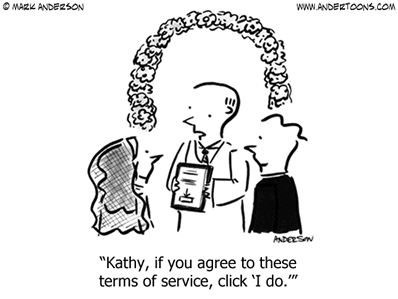Marriage Contracts

These examples are unusual but they make the point that in most places and at most times, marriage isn't about two (or more) people who love each other. It's about social contracts between kinship groups.

These examples are unusual but they make the point that in most places and at most times, marriage isn't about two (or more) people who love each other. It's about social contracts between kinship groups.
Next: The levirate
It's worth remembering that 'traditional' marriage wasn't usually about love and was often between people who had never met each other before they got engaged... and sometimes before they got married. When I worked in Africa, I knew many people who were married in absentia. That is, they were men who had gone to another country for a period of years to work. When they returned they were informed that they were married and that their wife was waiting for them ('Course, their wives had the same experience... I just didn't know them). Their marriages were determined by their families and conducted without them being present. So, if you really want a traditional marriage, let your parents or grandparents pick your spouse. My late co-author Serena wrote a great essay about this. You can read it here.
It's also worth pausing to consider the idea of love. Love seems a universal human emotion. There is no reason to think that people in other societies or in ancient societies experienced love, or longed for love any less than people in current societies. However, their expectations were very different. People didn't necessarily expect to find love in their marriages and the presence or absence of love in a marriage had little or nothing to do with the success of the marriage. So if spouses were not expected to be in love, who do people love? Well, parents certainly love children. In societies with very high child mortality (and that is most societies until the last 100 years) most parents lost children and they were expected to go on with their lives but they often grieved them deeply. People love siblings and same sex peers as well. Devotion among friends is often profound. But, does sex go with love? Often, yes... but two things: first, love is often frustrated. People loved outside of their marriages and frequently were not able to consumate their love. Second, this raises the important question: does love lead to sex or does sex lead to love? Do we (ideally) have sex with those we love? Or do we come to love those with whom we have sex? There is no clear answer to this question.
If you want to remember and understand this, and you like your lessons sung rather than written, you could do a lot worse than to watch this video. It's from the 1971 movie adaptation of the 1964 Broadway play Fiddler on the Roof. The play is about the lives of a Jewish family living in 19th century Ukraine. In this famous song, the husband (Tevye played by Chaim Topol 1935-2023) asks his wife (Goldie, played by Norma Crane 1928-1973) if she loves him, a question that has, until that point, not occurred to him. Fiddler on the Roof is very loosely based on Tevye The Dairyman, the central character of a series late 19th century short stories by Sholem Aleichem (1859-1916). Although the question Tevye asks Golde doesn't occur in the original stories, the ideas expressed in the song are, I think, deeply authentic to most marriages throughout the world before the 19th century... and in many cases, continuing into the recent past if not the present.